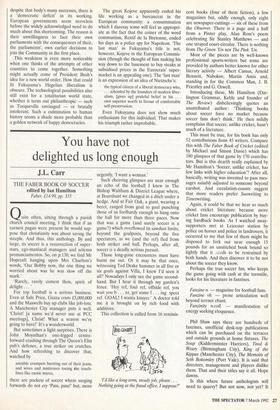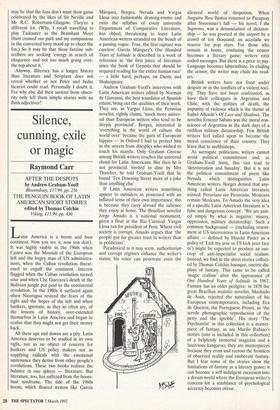You have not delighted us long enough
J.L. Carr
THE FABER BOOK OF SOCCER edited by Ian Hamilton Faber, £14.99, pp. 335 Quite often, sitting through a parish church council meeting, I think that if an earnest pagan were present he would sup- pose that christianity was about saving the steeple. And thus, this anthology. By and large, its soccer is a resurrection of super- stars, ego-maniacal managers and solemn pronunciamentos. So, on p.130, we find Mr Hoperaft hanging upon Mrs Charlton's words, 'Our Bobby now, the one thing we worried about was he was slow off the mark.'
'Rarely, rarely comest thou, spirit of delight ... '
For top football is a serious business. Even at Sale Price, Gazza costs £5,000,000 and the Maxwells buy up clubs like job-lots. A Manchester City manager puts it well. 'Christ! [a name we'd never use at PCC meetings], Christ! What a season we're going to have!' It's a wonderworld.
But sometimes a light surprises. There is John Moynihan's one-legged centre- forward crashing through The Queen's Elm pub's defence, a true striker on crutches. And how refreshing to discover that, watched by
amiable crumpets bursting out of their jeans, and wives and mistresses toeing the touch- lines like exotic mares,
there are pockets of soccer where surging forwards do not cry 'Pass, pass!' but, more urgently, 'I want a woman.'
Such cheering glimpses are near enough an echo of the football I knew in The Bishop Waltham & District League where, at Boarshunt we changed in a ditch under a hedge. And at Fair Oak, a giant, wearing a beret, ranged from goal to goal punching those of us foolhardy enough to hang onto the ball for more than three paces. Now that was a game (and surely soccer is a game?) which overflowed its sawdust limits, beyond the goalposts, beyond the five spectators, as we (and the ref) fled from both striker and ball. Perhaps, after all, soccer is a deadly serious pursuit.
Those long-gone encounters must have burnt me out. Or it may be that once, witnessing Ted Drake hammer in all five or six goals against Villa, I knew I'd seen it all? Nowadays I only see the game second- hand. But I hear it through my garden's fence. 'Hey ref, foul ref, offside ref, you wait you b . . . er, get some f. . . ing specs ref. GOAL! I wanta kissyer.' A doctor told me it is brought on by rich food with additives.
This collection is culled from 16 reminis- I'd like a long-term, steady job, please . . . Nothing going at the fraud office, I suppose?' cent books (four of them fiction), a few magazines but, oddly enough, only eight are newspaper-cuttings — six of these from the Observer. There is a page and a half from a Pinter play, Alan Ross's poem celebrating Sir Stanley Matthews — and one strayed court-circular. There is nothing from The Green 'Un nor The Pink 'Un.
Most of the pieces are by well-known professional sports-writers but some are provided by authors better known for other literary activity — Albert Camus, Arnold Bennett, Nabokov, Martin Amis and, standing in for the Common Man, J. B. Priestley and G. Orwell.
Introducing these, Mr Hamilton (Dar- lington Grammar, Keble and founder of The Review) disbelievingly quotes an unattributed author: 'Thinking books about soccer have no market because soccer fans don't think.' He then mildly complains that soccer, unlike cricket, hasn't much of a literature.
This must be true, for his book has only 52 contributions from 45 writers. Compare this with The Faber Book of Cricket (edited by Michael and Simon Davie) which has 180 glimpses of that game by 170 contribu- tors..But is this dearth really explained by Mr Hamilton's 'Soccer, unlike cricket, has few links with higher education'? After all, basically, writing was invented to pass mes- sages suitably adjusted to someone beyond earshot. And circulation-counts suggest that more readers prefer Sunwriting to Timeswriting.
Again, it could be that we hear so much about cricket literature because more cricket fans encourage publication by buy- ing hardback books. As I watched away- supporters met at Leicester station by police on horses and police in landrovers, it occurred to me that few of them might be disposed to fork out near enough 15 pounds for an unstitched book bound so tightly that it aeeds to be restrained by both hands. And then discover it to be not about the soccer they know.
Perhaps the true soccer fan, who keeps the game going with cash at the turnstile, looks for his literature in fanzines.
Fanzine n. — magazine for football fans. Fanzine vb. — prose articulation well beyond terrace chant.
Fanzinity n.coll. — manifestation of energy seeking eloquence.
Phil Shaw says there are hundreds of fanzines, unofficial desk-top publications which can be purchased on the terraces and outside grounds at home fixtures. The Soup (Kidderminster Harriers), Tired & Weary (Birmingham City), King of the Kippax (Manchester City), The Memoirs of Seth Bottomley (Port Vale). It is said that directors, management and players dislike them. That and their titles say it all. Hope dawns.
Is this where future anthologists will need to quarry? But not now, not yet? It may be that the fans don't want their game celebrated by the likes of Sir Neville and Mr R.C. Robertson-Glasgow. They're a different lot. (Why, I recall travelling to play Tadcaster as the Bramham Moor Hunt crossed our path and my companions in the converted lorry stood up to cheer the fox.) So it may be that these fanzine sub- scribers are seeking 'energy in search of eloquence and not too much going over- the-top about it.'
Anyway, illiteracy has a longer history than literature and Scripture does not reveal whether or not Peter and Judas Iscariot could read. Personally I doubt it. For why else did their saviour from obscu- rity only tell them simple stories with no flash adjectives?



















































 Previous page
Previous page